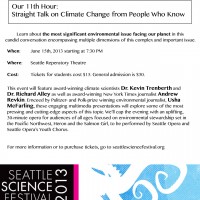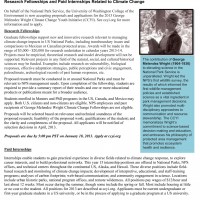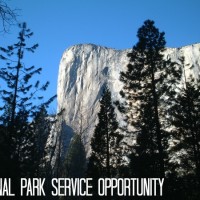The project will be located at the UW with some fieldwork in North Cascades National Park and Mount Rainier National Park. The salary is $12 per hour.
The intern should be enrolled in or have completed a four year degree program with a focus or degree in the geographic or biological sciences (e.g., geography, ecology, biology, geology), and/or civil and environmental engineering. The ideal candidate would have intermediate to advanced GIS skills, experience working in small teams with effective communication skills including report writing, good interpersonal skills, and some field experience working in remote areas.
The position will remain open until Friday, May 17 at 5:00 p.m. PDT. Students may apply at www.ccyi.org AND they should email me at ccyi@uw.edu to notify me of their application.
Benaroya Hall
Wednesday Nov. 7th 2012
7:30 – 10:30 PM
Deirdre Cybele Smith from 350.org is offering free tickets for students, faculty and staff who are interested in the upcoming divestment campaign to attend McKibben & Crew’s “Do the Math” tour! She’s working to connect student environmental and climate action groups to the event – to make sure they know about it, are welcome, and get inspired for real change, not climate change.
Contact Deirdre at deirdre@350.org if you or anyone you know might be interested!
Tar Sands Pre-Trip Reading and Viewing

(photo credit: Suncor Energy)
Here are some of the articles, websites and documentaries I’ll be digging into ahead of the trip:
The Canadian Oil Sands: Economic savior or environmental disaster? | UW Bevan Series | David Schindler (Click here for a video of the talk.)
Global Warming’s Terrifying New Math | Rolling Stone | Bill McKibben
The Canadian Oil Boom | National Geographic | Robert Kunzig (text) & Peter Essick (photography)
Cry Wolf | DeSmogBlog | Carol Linnitt
Game Over for the Climate | The New York Times | James Hansen
Secrets to Norway’s Petro-Wealth: Lessons for Canada? | The Tyee | Mitchell Anderson
Athabasca Oil Sands | Wikipedia
Tipping Point: The Age of the Oil Sands | CBC | Produced by Niobe Thompson and Tom Radford & hosted by Dr. David Suzuki
Ethical Oil | Ezra Levant
The Canadian Association of Oil Producers
If you have any ideas for what else I should I be reading, watching and doing to get ready, please leave me a comment.
“Cows are happy in parts of Northern California and not in Florida”
Some new research done by Yoram Bauman (and others) sheds light on climate change and milk production:
[event] – Movie: The Island President
Tickets: $10 | $5 SIFF Members | $9 Youth (20 & under) and Seniors (65+)
Matinees: $7 | $5 SIFF Members
SIFF Cinema passes and vouchers are valid at the box office.
From director Jon Shenk (The Lost Boys of Sudan) comes the story of PresidentMohamed Nasheed of the Maldives, a man confronting the literal survival of his country and everyone in it. After bringing democracy to the Maldives after thirty years of despotic rule, Nasheed is now faced with an even greater challenge: as one of themost low-lying countries in the world, a rise of three feet in sea level would submerge the1200 islands of the Maldives enough to make them uninhabitable.
The Island President captures Nasheed’s first year of office, culminating in his trip to theCopenhagen Climate Summit, where the film provides a rare glimpse of the political horse-trading that goes on at such a top-level global assembly. Nasheed is unusually candid about revealing his strategies—leveraging the Maldives’ underdog position as a tiny country, harnessing the power of media, and overcoming deadlocks through an appeal to unity with other developing nations. Despite the modest size of his country, Mohamed Nasheed has become one of the leading international voices for urgent action on climate change.
On February 7, 2012, Nasheed was forced to resign the presidency under the threat of violence in a coup d’etat perpetrated by security forces loyal to the former dictator. Thefuture of the president, and the island, remain unclear.
[internship] – Mt. Rainier Field Research Internship Opportunity (possibility paid!)

The Hille Ris Lambers lab at University of Washington is looking for 5-8 Undergraduate Research Interns for field work assistance at Mt. Rainier National Park. We study how rising temperatures and declining snow accumulation (i.e. climate change) will affect the forests and wildflower meadows of Washington. Broad research topics you might assist us with include the relationship between tree growth and climate, the determinants of range limits, plant-pollinator interactions, the importance of seed supply vs. microsites for plant recruitment, and the effects of climate and soil conditions on high elevation plants.
– For more details on the position, please see the attached flyer.
https://docs.google.com/a/uw.edu/file/d/0B2-f0ngU8xksOEVOT3J2WDVJbFE/edit
– For more information on research conducted in our lab, please visit http://protist.biology.washington.edu/oikos/Index.html.
– To apply, please visit the following website: https://catalyst.uw.edu/workspace/jhrl/29766/.
Thank you for your interest! Janneke HilleRisLambers (jhrl[at]uw.edu)
[program] MSc Economics of Climate Change
Check out this cool masters program in the UK!
The program aims to provide a thorough postgraduate education in the specialist area of climate change economics and policy. The compulsory core modules provide a critical understanding of current theories and empirical research in this field of knowledge and students will develop a practical understanding of the application of this knowledge within an institutional framework.
For further details please contact Dr Della Giusta – m.dellagiusta@rdg.ac.uk
[course] – Spring 2012: Carbon and Climate Change on Campus
Spring 2012
ENVIR 480: Sustainability Studio: Carbon and Climate Change on Campus
TTH 1:30-3:20 in ACC 120
What is the University of Washington doing, and what can we do, to lower our carbon footprint?
Carbon & Climate on Campus
In 2009, UW released its Climate Action Plan and committed to a major reduction of its greenhouse gas emissions over the next generation. The Plan envisions a variety of strategies to put UW on a more sustainable path, and seeks to engage faculty, students, and staff in doing so. So what’s happening now? And what more can be done?
Sustainability Studio
ENVIR 480 is a hands-on exploration of sustainability on campus, where students learn about sustainability not as an academic concept but an applied practice. Readings and coursework focus on tangible skills for analyzing, communicating about, and making change for sustainability. This spring, ENVIR 480 will focus on carbon and climate on the UW campus:
Students will work with experts from the UW and beyond to understand the drivers of GHG emissions on campus and understand how the UW is attempting to reduce these emissions.
Students will work in small groups to complete hands-on, quarter-long projects focused on carbon emissions on campus. These projects might include applied research, cost-benefit analyses, community organizing, and more. To see the work students have done in the past, check here.
If you have any questions, please feel free to contact Justin Hellier at hellier@uw.edu.
**For Environmental Studies majors and minors – this course will fulfill Policy & Decision Making and/or Fieldwork for Perspectives and Experiences**




